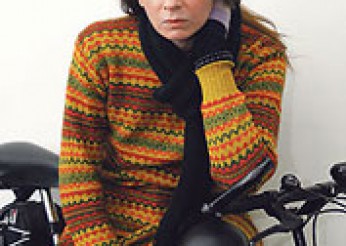Soviet film avant-garde and its tendency to create a cinema that differs from well-known expressive forms as the newly established social system varies from previous social systems, is one of the main tendencies in history of film
Only after Dziga Vertov revolutionized Eisenstein’s documentarism, and who on the other hand is in a new way as dramatic as Pudovkin is original in his film epics, Aleksandr Petrovich Dovzhenko (1894 - 1956) appeared. His main characteristic is exceptional handling of parallel stories, more individualized characters, love for history and legends, use of landscapes as an equal protagonist as well as lyricism and true pathos. One of the reasons for his special place is his tight connection to his home country Ukraine, which is especially visible in his first feature film Zvenigora (1928) in which he combines legends and historical events from the Ukrainian fight for independence as well as scenes from the October Revolution. At that time Stalin’s influence on cinema became stronger and he closed down film studios in Odessa (in which Dovzhenko made his debut film) and Yalta, which both had a rich tradition that dated to the time before the Revolution; it was only later that Ukrainians made a film studio n Kiev. That is when Dovzhenko got summoned to Moscow where he publicly had to self-critically state that the first goal of film is to “… beat the reactionary Ukrainian nationalism and chauvinism and praise the Ukrainian work class that made the socialist revolution possible”.
This is somewhat visible in his next films even though the directorial strength and an impressive visual style dominate them. This is especially so in the film The Earth (1930) that at the World Exhibition in Bruxelles in 1958 was chosen as the 10th best film of all time. It tells the story about rural collectivization but it is at the same time an ode to the natural beauties. The style itself, even though it is not free from ideological divergence, caused suspicion of the government. Therefore his biographical film about the Ukrainian hero of the revolution Schcors (1939) was heavily controlled already at the time of filming. Later the same situation happened while Dovzhenko filmed the biography of the Russian biologist Mičurina (in 1947), upon Stalin’s order, every roll of film was inspected filming location. Afterwards, it took Dovzhenko a long time to get another project started. It was the film Poem of the Sea, which he prepared for a long time and finally died before the shooting began.
In 1958, Dovzhenko’s wife Yuliya Ipolitovna Solntseva (1901 - 1989) finished the film based on his screenplay and ideas. She started her career as an actress in Aelita (1924) by Jakov A. Protazanov, and acted also in The Earth as well as assisted in directing it. Afterwards she became Dovzhenko’s permanent assistant director as well as co-director of his feature documentaries that he made in the first half of 1940s. At the time the film Poem of the Sea had been made many were too critical about her directing but nevertheless she made several other of Dovzhenko’s projects and proved that even though she is not exactly in her husband’s league, she is still a capable director. For her film Chronicle of Flaming Years she was awarded in Cannes. Therefore inclusion of her films in this program is rather interesting and praiseworthy. (Tomislav Kurelec)
